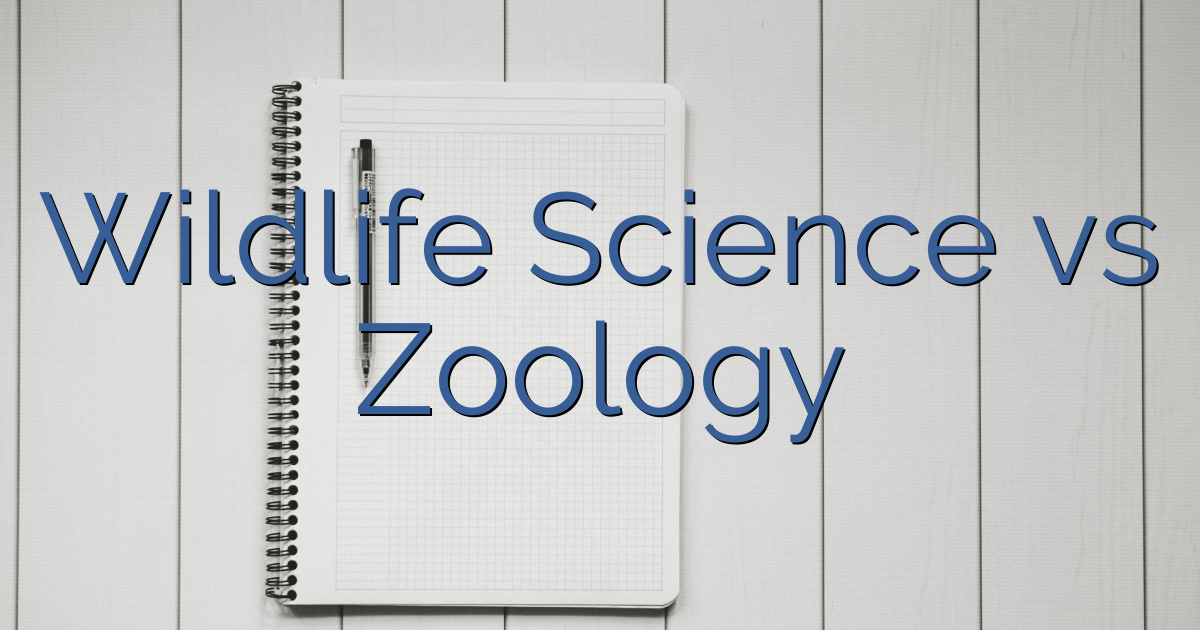
Are you torn between pursuing a degree in Wildlife Science or Zoology? You may be thinking, ‘What’s the difference? Aren’t they essentially the same?’
While both fields share similarities, it’s important to dig deeper and understand the nuances that set them apart. In this article, we will explore the curriculum, ecological skills developed, career opportunities, and salary potential in both Wildlife Science and Zoology.
By the end, you’ll have a clearer picture of which major aligns with your interests and goals.
Table of Contents
Key Takeaways – Wildlife Science vs Zoology
- Wildlife Science and Zoology are related fields, but have different focuses.
- Wildlife Science prepares students for careers in wildlife management and conservation, while Zoology allows specialization in various areas of animal biology.
- Both majors have a strong emphasis on fieldwork, which provides practical experience and opportunities for research.
- Both majors contribute to the understanding of ecological principles and offer career opportunities in research, conservation, and animal management.
Overview of the two majors: Wildlife Science and Zoology
If you’re interested in studying animals, you’ll want to know the difference between the majors of wildlife science and zoology.
Both majors offer exciting career prospects and numerous research opportunities.
Wildlife science focuses on the management and conservation of wildlife populations and their habitats. This major equips you with the knowledge and skills to work as a wildlife biologist, conservation officer, or park ranger. You’ll have the chance to study the behavior, ecology, and physiology of different species, as well as their interactions with the environment.
On the other hand, zoology is a broader field that encompasses the study of all animal species. With a degree in zoology, you can pursue careers in research, education, and conservation. You’ll have the opportunity to specialize in areas such as animal behavior, evolutionary biology, or marine biology.
Both wildlife science and zoology offer exciting and rewarding paths for those passionate about studying animals.
Overview of the curriculum and coursework of the two majors
The curriculum and coursework for the two majors provide a comprehensive understanding of the study of animals. In both Wildlife Science and Zoology programs, students delve into various areas of animal biology, behavior, ecology, and conservation. The coursework structure is designed to equip students with theoretical knowledge and practical skills necessary for a career in animal-related fields. Fieldwork requirements are an integral part of these majors, offering hands-on experiences for students to apply their knowledge in real-world settings. This enables them to develop critical thinking skills, conduct research, and gain an appreciation for the complexities of wildlife and animal behavior. The table below highlights some of the key coursework and fieldwork requirements for both majors:
| Coursework Structure | Wildlife Science | Zoology |
|---|---|---|
| Animal Physiology | ✓ | ✓ |
| Wildlife Conservation | ✓ | |
| Animal Behavior | ✓ | ✓ |
| Ecology | ✓ | ✓ |
| Field Study Methods | ✓ |
Overall, the curriculum and coursework of these majors provide a solid foundation for individuals interested in the study and conservation of animals.
Overview of coursework, assessments, and fieldwork opportunities
Both majors offer a range of coursework, assessments, and fieldwork opportunities to provide you with a well-rounded education in animal studies.
In wildlife science, coursework focuses on understanding the ecology, behavior, and conservation of wildlife populations. Assessments in this major typically include exams, research projects, and presentations that test your knowledge and understanding of these topics. Fieldwork opportunities in wildlife science allow you to gain practical experience in conducting surveys, collecting data, and monitoring wildlife populations in their natural habitats.
In zoology, coursework covers a broader range of topics including animal anatomy, physiology, and taxonomy. Assessments in zoology may include laboratory experiments, research papers, and oral exams to evaluate your understanding and application of the principles learned. Fieldwork opportunities in zoology often involve studying animals in different environments, such as marine biology research or conducting surveys in terrestrial ecosystems.
Both majors provide valuable fieldwork opportunities that allow you to apply your knowledge and skills in real-world settings. These experiences not only enhance your understanding of animal studies but also provide valuable hands-on experience that can help you in your future career in the field.
Comparison of Ecological Skills Developed
Developing strong ecological skills is an essential aspect of studying animals. In both wildlife science and zoology, you will have the opportunity to enhance your understanding of ecological principles and their application in real-world settings. Both disciplines employ various ecological research methods to gather data and analyze the interactions between organisms and their environment.
Fieldwork experience is a crucial component of ecological research. It allows you to directly observe and collect data on animal behavior, population dynamics, and habitat preferences. Through fieldwork, you will learn to use techniques such as transect surveys, camera trapping, and habitat assessments to assess biodiversity and understand ecological processes.
This hands-on experience will provide you with valuable insights into the complexities of ecosystems and the factors that influence animal populations. It will also allow you to contribute to the conservation and management of wildlife and their habitats.
Comparison of Career Opportunities and Job Roles in Wildlife Science and Zoology: Conservation
Conservation offers diverse career opportunities and job roles for individuals interested in studying and protecting animal species and their habitats. In the field of wildlife science, career paths can include wildlife biologist, conservation scientist, or wildlife manager. These professionals focus on conducting research and implementing conservation strategies to preserve species and their habitats. They may work for government agencies, non-profit organizations, or private companies.
Research opportunities in wildlife science can involve studying population dynamics, habitat restoration, or the impacts of human activities on wildlife. On the other hand, zoology offers career paths such as zoologist, animal behaviorist, or zookeeper. Zoologists study animal behavior, physiology, and ecology, and may work in research institutions, zoos, or museums.
Research opportunities in zoology can involve studying animal anatomy, genetics, or evolutionary biology. Both wildlife science and zoology provide exciting avenues for those passionate about protecting and understanding animal species.
Comparison of Salary Potential in Wildlife Science and Zoology
Now, let’s delve into the comparison of salary potential in Wildlife Science and Zoology. Understanding the earning potential in these fields is crucial for making informed career decisions.
- Salary Potential in Wildlife Science:
- Wildlife Biologists can expect an average annual salary of $63,420.
- Environmental Scientists and Specialists earn an average of $71,360 per year.
- Ecologists can earn an average salary of $65,380 annually.
- Salary Potential in Zoology:
- Zoologists and Wildlife Biologists earn an average annual salary of $63,270.
- Research Scientists in Zoology can expect to earn around $68,230 per year.
- Curators and Museum Technicians in Zoology earn an average salary of $49,850 annually.
When considering salary potential, it is important to also consider the job outlook. Both Wildlife Science and Zoology offer promising job prospects, with a projected growth rate of 5% for Wildlife Biologists and 4% for Zoologists. This indicates a stable and growing job market in both fields, providing ample opportunities for career advancement and salary growth.
Similarities between Wildlife Science and Zoology curriculums
Both fields have a strong emphasis on hands-on fieldwork and research projects. However, there are some key differences between wildlife science and zoology that can significantly impact job prospects.
In wildlife science, the focus is mainly on the study and management of wild animal populations and their habitats. This field often involves working with government agencies and conservation organizations to monitor and protect endangered species and ecosystems.
On the other hand, zoology encompasses a broader study of animals, including their physiology, behavior, and evolution. Zoologists may work in a variety of settings, such as museums, universities, or pharmaceutical companies.
While both fields offer exciting career opportunities, wildlife science tends to have more job prospects in conservation and natural resource management, while zoology offers a wider range of options in research, academia, and industry.
Difference in Job Outlook between the two majors
In terms of job prospects, there are notable differences between the two majors, wildlife science and zoology. While both fields involve the study of animals, their focuses and career opportunities differ. Here are some key differences to consider:
- Salary: Wildlife scientists tend to earn higher salaries compared to zoologists. This is due to the specialized knowledge and skills required in wildlife conservation and management, which are in high demand in industries such as environmental consulting and government agencies.
- Job Market Demand: The job market for wildlife scientists is growing rapidly, driven by the increasing need for conservation efforts and sustainable resource management. On the other hand, zoology careers are more competitive, with limited positions available in research institutions and zoos.
- Career Path: Wildlife scientists often work in field-based roles, conducting research, monitoring wildlife populations, and implementing conservation strategies. Zoologists, on the other hand, have a broader range of career options, including research, education, and animal care.
- Industry Opportunities: Wildlife scientists have opportunities to work in various sectors, such as government agencies, non-profit organizations, and environmental consulting firms. Zoologists, on the other hand, often find employment in research institutions, zoos, museums, and universities.
Overall, while both majors offer exciting career paths, it is important to consider the differences in salary potential and job market demand when making your decision.
Factors to consider when choosing between Wildlife Science and Zoology: Specializations
When choosing between wildlife science and zoology, you should consider the different specializations within each field. Specializations play a crucial role in shaping your career prospects and determining the specific area of focus within the broader discipline.
In wildlife science, potential specializations include wildlife biology, conservation biology, wildlife management, and ecology. Each of these specializations offers unique opportunities to study and work with diverse species and ecosystems, contributing to the conservation and management of wildlife populations.
On the other hand, zoology offers specializations such as animal behavior, comparative anatomy, evolutionary biology, and marine biology. These specializations allow you to explore the intricacies of animal life, from their behavior and physiology to their evolutionary history.
Conclusion
In conclusion, choosing between Wildlife Science and Zoology can be a wild ride! Both majors offer a fascinating exploration of the natural world, with diverse coursework and exciting fieldwork opportunities.
While their curriculums have similarities, each major has its own unique focus and specializations to consider. The job outlook for both fields is promising, with plenty of career opportunities in conservation and research.
Keep in mind that the salary potential may vary, but the passion for wildlife and nature is priceless.
So, buckle up and embark on an incredible journey in the world of wildlife science or zoology!

